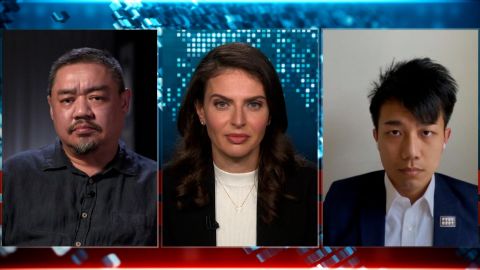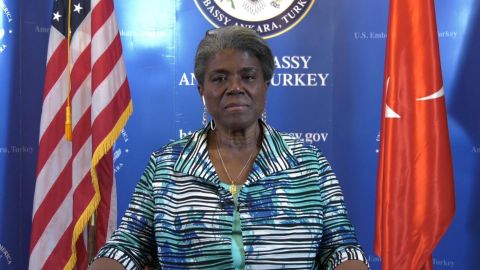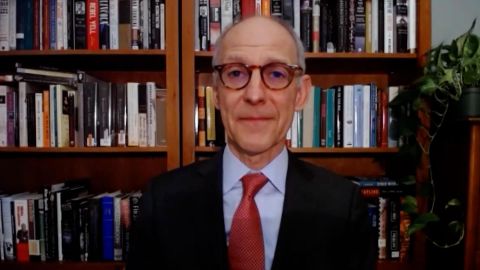Read Transcript EXPAND
BIANNA GOLODRYGA:
Now, to the U.S., where another 18 million adults need to get their COVID shot in order to reach President Biden’s vaccination goal. The
administration wants 70 percent of all adults to have at least one dose by 4th of July.
Dr. Ezekiel Emanuel is a bioethicist and oncologist. He served on President Biden’s COVID-19 advisory board and was a White House health policy adviser
during the Obama administration. Here he is talking to Hari Sreenivasan about vaccine hesitancy.
(BEGIN VIDEO CLIP)
HARI SREENIVASAN: Bianna, Thanks, Dr. Ezekiel Emanuel, thanks for joining us.
First, here we are in the middle of quasi return to normalcy and we seem to hit a little bit of stumbling block here in what sort of authority,
employers, community organizations, universities, should exercise when it comes to mandating vaccines?
EZEKIEL EMANUEL, MEMBER OF BIDEN’S TRANSITION COVID-19 ADVISORY BOARD: Well, let’s be clear. On April 13th, we hit a high point in terms of giving
out vaccines to people with about 3.4 million doses delivered on that one day. And we are down to 1.1 million doses with only about 50 percent of the
total population vaccinated. So, we need to get it up.
Employers have authority to ask their employees to be vaccinated as a term of future employment. My institution, the University of Pennsylvania, just
put out a requirement. Students are going to be required to be vaccinated, but so are staff, faculty and post-doctoral fellows are going to be
required to be vaccinated. So, employers can do this, and I think they probably should for a safe environment.
SREENIVASAN: Should we be looking at this similar to how workplaces and schools and so forth have looked at the flu vaccine? I mean, this is a more
effective vaccine than what you get on an annual basis from — you know, when you go for the flu shot.
EMANUEL: Absolutely. A lot of work places, especially health care work places, require their employees to get the annual flu vaccine because they
don’t want to spread the virus to their patients and other workers. And they require it. This, as you point out, is way more effective, fewer side
effects, and the disease which you are protecting people from, COVID, is a lot worse than influenza.
And so, I think that the logic of requiring vaccination in the health care setting extends to this. But also, we should recognize lots of states
require children, students, under 18, to get vaccinated for a whole series of conditions. And there are states like Mississippi, like California that
say none of this philosophical objection, I just don’t like it, I am worried about autism.
You have to get — the children have to get vaccinated because it protects people. Those states typically have had very severe outbreaks of illnesses
like measles, and one of the major reasons they had outbreaks despite effective vaccines is because a lot of people acting out on this
“philosophical ground or personal grounds.”
SREENIVASAN: So, do you think we should mandate that, come this fall, kids should have a COVID vaccine if they want to be in the classroom?
EMANUEL: I do think that is appropriate. I also — I argue it is appropriate for health care workers who are going to come in contact with
patients, whether they’re physicians, nurses, phlebotomist who draw blood, respiratory therapists, they should be vaccinated. I think that’s an
important measure to reduce the spread of the virus, which has been, remind ourselves, very, very deadly and very — have severe economic dislocations
for millions and tens of millions of Americans.
SREENIVASAN: One of the things that concerns parents, especially on school age children getting vaccinated, is just that there is not enough long-term
data for them to get comfortable with it. If they — if you say, hey, look, the MMR vaccines that you gave your kids when they were tiny, they say,
well, yes. There’s 30, 40 years’ worth of data says that the stuff works. This is just the first time this vaccine has been rolled out. What’s the
harm in waiting? What’s the case that you make to those parents?
EMANUEL: COVID is the harm that’s waiting out there for you. So, look, it is not like we haven’t used the vaccine. 2 billion doses have been given of
various kinds of this vaccine. That’s the first thing. We haven’t seen lots of side effects. That’s the second thing.
Third, to the extent that we see side effects like blood clots, it’s been in a very small group of people and it’s occurred rapidly after the
vaccine. When you give someone the mRNA vaccine, that mRNA that excites the immune system, that is gone within 48 hours of injection into the person’s
body. That’s not integrating into cells. It’s not causing other types of problems. It is really chewed up by enzymes.
And we have begun to follow people out more than six months, and we’re not seeing any increase in some unknown serious side effect. And then when you
compare that to COVID with, you know, serious risk of hospitalization and death, serious risk of long hauler syndrome, it seems that it is — the
cost benefit ratio here is weighed in the event that the vaccine. And, again, we just haven’t seen those kinds of hypothetical long-term
complications from the vaccine.
SREENIVASAN: We’ve also seen the amount or a number of people who are hesitant toward vaccines rise. And what do you do about those people for
whom it might be a religious conviction, it might be just a personal belief, but they feel like their freedoms are being encroached on if they
are asked to get a vaccine by an employer?
EMANUEL: For the people who say, it is my freedom, frankly, I thought we were a country where individual responsibility was important. If you don’t
get vaccinated, you are not taking responsibility for your health and for the impact you might have on other people. It is not just your freedom.
After all, if you get infected and spread the infection, you are impacting other people, and you’re not taking responsibility for your influence on
others.
In addition, if you get sick, require hospitalization, you’re impacting everyone, who is going to pay the bill? It’s not like you’re paying your
hospital bill. It is collective, whether you have insurance or you get a government program, we are all pitching in money to pay your bill. And
again, that’s not taking minor preventative action that you can take to not impose burdens, whether burdens of infection or burdens of cost on other
people.
Those people who champion their individual freedoms also typically have to champion their responsibility for exercising freedoms. And I don’t think
they’re doing that in equal measure.
SREENIVASAN: Is there a potential for kind of a free rider problem here, where the number of people that eagerly got their vaccine, who feel like it
is their part to help society overall, right, I gain a level of confidence once I get the shot in my arm to go and start engaging in life because I
feel like, well, the threat to me is much, much lower, and the idea that I’m going to infect somebody else even if I had COVID is much, much lower,
right? But there’s going to be people who decided to sort of ride this entire thing out and say, well, Hari is getting a shot and everybody else
around me is getting the shot, I’m good?
EMANUEL: Yes. I think this goes back to the whole issue of individual responsibility and social norming. Free riders is basically people saying,
look, I’m not taking responsibility. I am letting other people take the burdens of decreasing the COVID infection rate in society and I’m going to
benefit but I’m going to take no risks when it comes to decreasing that burden. That is not a matter of individual responsibility, that’s not
freedom, that is simply putting the cost of controlling this pandemic on someone else. That is very anti-American.
And it is one of the reasons I actually object to this sort of philosophical or personal reasons not getting the vaccine. That is a total
free rider problem. It’s not assuming individual responsibility. Our social norm should be, everyone has to assume their responsibility for our
collective benefit. Part of that is getting fully vaccinated. Part of that is doing the right thing, especially when the burdens of getting vaccinated
and the risk of getting vaccinated are so low.
SREENIVASAN: You’ve called for a standard when it comes to a vaccine mandate. So, if I’m traveling across these 50 states, there are potentially
50 different sets of rules that I have to deal with on a state-by-state basis. So, how would it even work if I had to prove that I have been
vaccinated?
EMANUEL: Well, right now you pull out your piece of paper from the vaccine site. That’s really your vaccine certification at the moment. That’s what I
have and that’s what anyone who’s been vaccinated. Most of us recognize that’s not very adequate.
It does have essential information like the (INAUDIBLE) you got and the type of vaccine you got, but it’s as many people have noted, easily forged.
And that is not a good place for the country to be. And databases that have real reliable information have not been joined together and people given a
way of certifying that they’ve been vaccinated that can’t be forged, is easily accessible and can be shown to people.
SREENIVASAN: It seems almost an exercise in how you position this, and if you say, you know, vaccine passport from the government, it sets off alarm
bells to some people, whereas if you create enough FOMO, fear of missing out, OK, this is just one thing that I needed to do in order to be able to
do all this other stuff, right? So, if you want to go to an amusement park, you want to go stay in a hotel, if you want to get on an airplane, if all
of those different vendors say, hey, can you show me your vaccine card or your most recent PCR test, maybe we — and I don’t know, maybe we think
about it differently.
EMANUEL: Well, look, we’ve understood a lot about human behavior, and one of the things we do understand about human behavior is that we all socially
norm. That is, we look around at what other people are doing to determine what the right thing to do is. And I think we haven’t used social norming
enough in this pandemic to get people to do the right thing.
We learned about this with masks. You know, if you’re in a place where 90 percent of people are wearing mask, you’re going to wear a mask because
that’s the social norm. That’s what everyone else is telling you and you want to be in step with other people. When we social norm on everyone is
vaccinated here, we’re going to check and everyone is going to be vaccinated, you’re going to be reassured, everyone else is going to be
reassured, people begin to understand that’s the right thing to do.
So, what other people do communicates to us what the right thing to do is. And I think we need to use that technique to increase the number of
vaccines.
SREENIVASAN: If we stayed under whatever that threshold is for herd immunity, if it’s 70 percent of if it’s 65 percent or if it’s 80 percent,
if we don’t get there as a country, spell out what can happen to us?
EMANUEL: Well, the big worry is that we’re going to have pockets where we’re not at high levels of vaccination. We have seen nursing homes, you
can drop the hospitalization rate, you can drop the death rate substantially by getting vaccinations way up. We have seen in the country
as a whole, we are at 50 percent of people having one dose. And we have seen the hospitalization rates come way down, the case rates come way down
and death rates come way down.
But they’re still higher than annual flu cases and deaths, and the reason is 50 percent of the population isn’t vaccinated. And if we don’t get
there, we’re still going to have substantially more people dying from COVID, maybe 100, 150,000 per year.
That seems to me unacceptable. And, you know, it may not rise to the level of a national emergency, but it is an avoidable death rate. And we — with
one vaccine. And we should really push the country, get people to recognize their responsibility for reducing the mortality here from COVID.
SREENIVASAN: This pandemic has opened the eyes to a lot of people on just gross inequities that exist around the planet, not just where the vaccines
are created, how much they cost, how they get delivered. The White House just announced that they’re going to donate another 25 million doses of
vaccine to COVAX. What should the White House be doing? What should America be doing right now?
EMANUEL: Well, look, we’ve distributed 370 million or so vaccines. We’ve administered nearly 300 million vaccines. We have 70 million surplus
vaccines in refrigerators right now. And the companies, Moderna, J&J and Pfizer that are authorized for use in the United States are producing more
than 4 million, 5 million doses collectively every day.
We have more than enough vaccine to send to other countries. And we’ve got all that 60 million AstraZeneca waiting that still hasn’t been approved by
the FDA, checking that it’s efficacious and doesn’t have infectious contaminants in it.
I think we have to step up our shipments. I agree with shipping some vaccine to COVAX. I disagree with the way COVAX is distributing the vaccine
but we do need to support COVAX. And I think it’s very important to ship vaccine to countries that are having serious surges and are just beginning
on the upward swing.
Latin America is still having serious problems. You have problems in places like Mongolia and other parts of the world. And we need to do our part. I
mean, if America is back, as President Biden says, part of being back is to lead the world in COVID vaccines.
SREENIVASAN: So, what’s the problem with global distribution today and how would you alter it?
EMANUEL: So, COVAX, this international organization that was created by three groups has got countries contributing, buying vaccines from them,
they’re meant to have fair and equitable vaccine distribution, and they, without much ethics input, I might say, said that we should distribute the
first 20 percent of the vaccines on the basis of population rather than on the basis of what you might call COVID burden or COVID need. I think that’s
wrong.
I agree with COVAX, it shouldn’t be money, it shouldn’t be the wealth of the country that determines how much vaccine they get, but I disagree, I
don’t think it should be population either. I think it should be the burden of COVID. Take countries that really aren’t having a big explosion of
COVID, Ethiopia, Ghana, lots of countries that are poor aren’t having a big explosion of COVID. I’m not sure we should prioritize sending vaccines to
those countries.
Other countries are having big explosions of — are real hot spots for COVID, and they should take priority. I mentioned Peru is one example, but
almost all of Latin America is having serious, serious outbreaks. The United States is probably the most efficient producer of these vaccines. As
I said, we’re well north of 4 million and we’re going to be well north of 5 million by end of the month, and we need to begin exporting because we’re
only vaccinating 1 million Americans. That’s a 4 million per day surplus.
We are — supply is outstripping demand. And I think it is our responsibility to distribute that, to have the biggest impact on the
pandemic.
SREENIVASAN: Dr. Ezekiel Emanuel, thanks so much for joining us.
EMANUEL: It has been my pleasure. Thank you.
About This Episode EXPAND
Linda Thomas-Greenfield; Wu’er Kaixi and Finn Lau; Dr. Ezekiel Emanuel
LEARN MORE


